Coaching, Mentoring, and Teaching: Working with Individual Learners
VerifiedAdded on 2023/06/16
|10
|2674
|371
Report
AI Summary
This report explores the roles of coaching, mentoring, and teaching in meeting the diverse learning needs of individual students. It analyzes the responsibilities and differences between these roles, emphasizing their effectiveness in addressing specific student challenges. The report provides justification for selecting appropriate strategies like coaching for skill development, mentoring for guidance, and teaching for knowledge acquisition, using case studies of Aran and Lissa to illustrate practical application. It reviews resources required for a multi-aging approach, factors influencing the referral process, and includes an action plan for developing interpersonal, analytical, and data management skills to enhance one-on-one teaching practices. The action plan details specific skills, timelines, resources, and monitoring methods for continuous improvement.
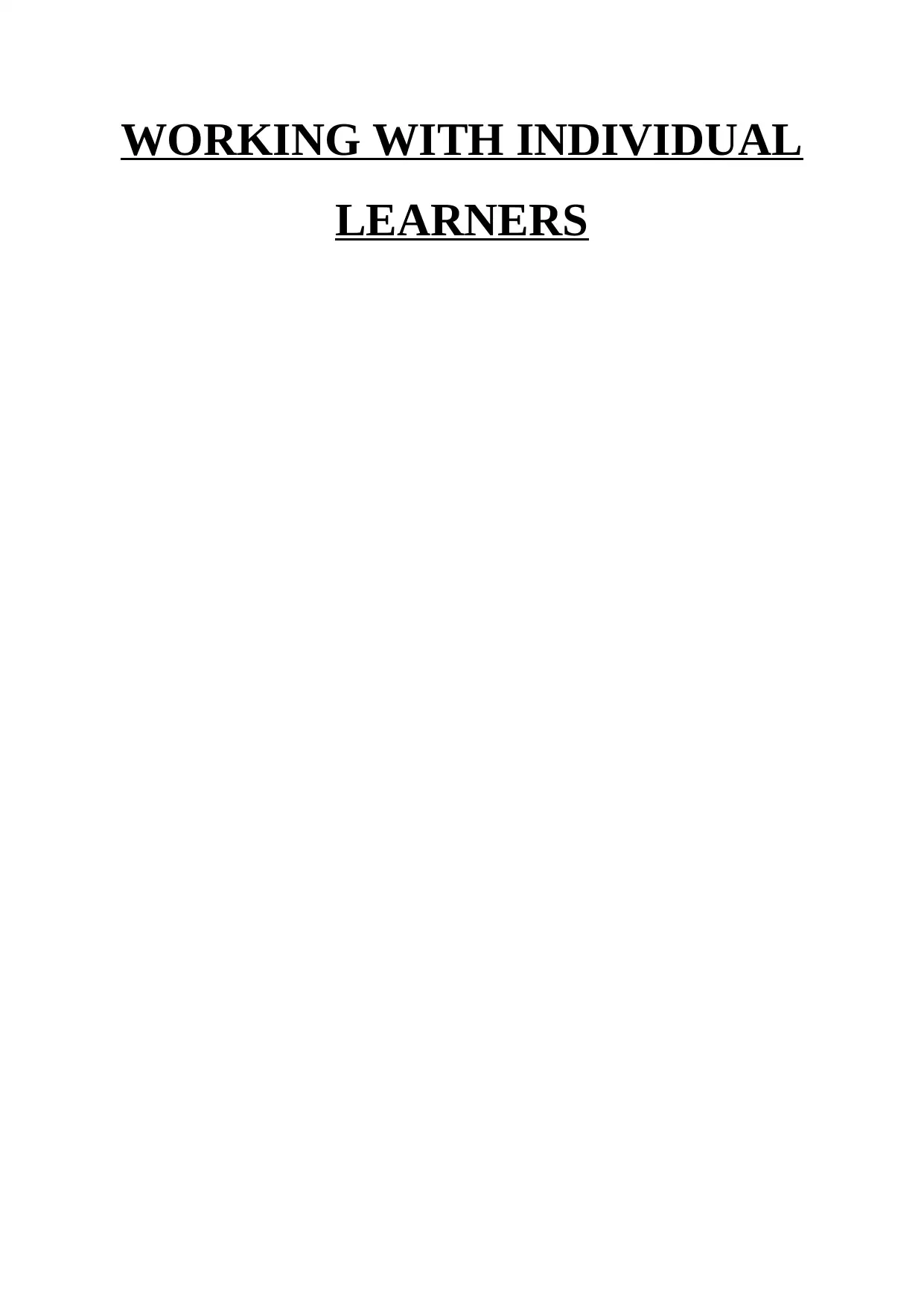
WORKING WITH INDIVIDUAL
LEARNERS
LEARNERS
Paraphrase This Document
Need a fresh take? Get an instant paraphrase of this document with our AI Paraphraser
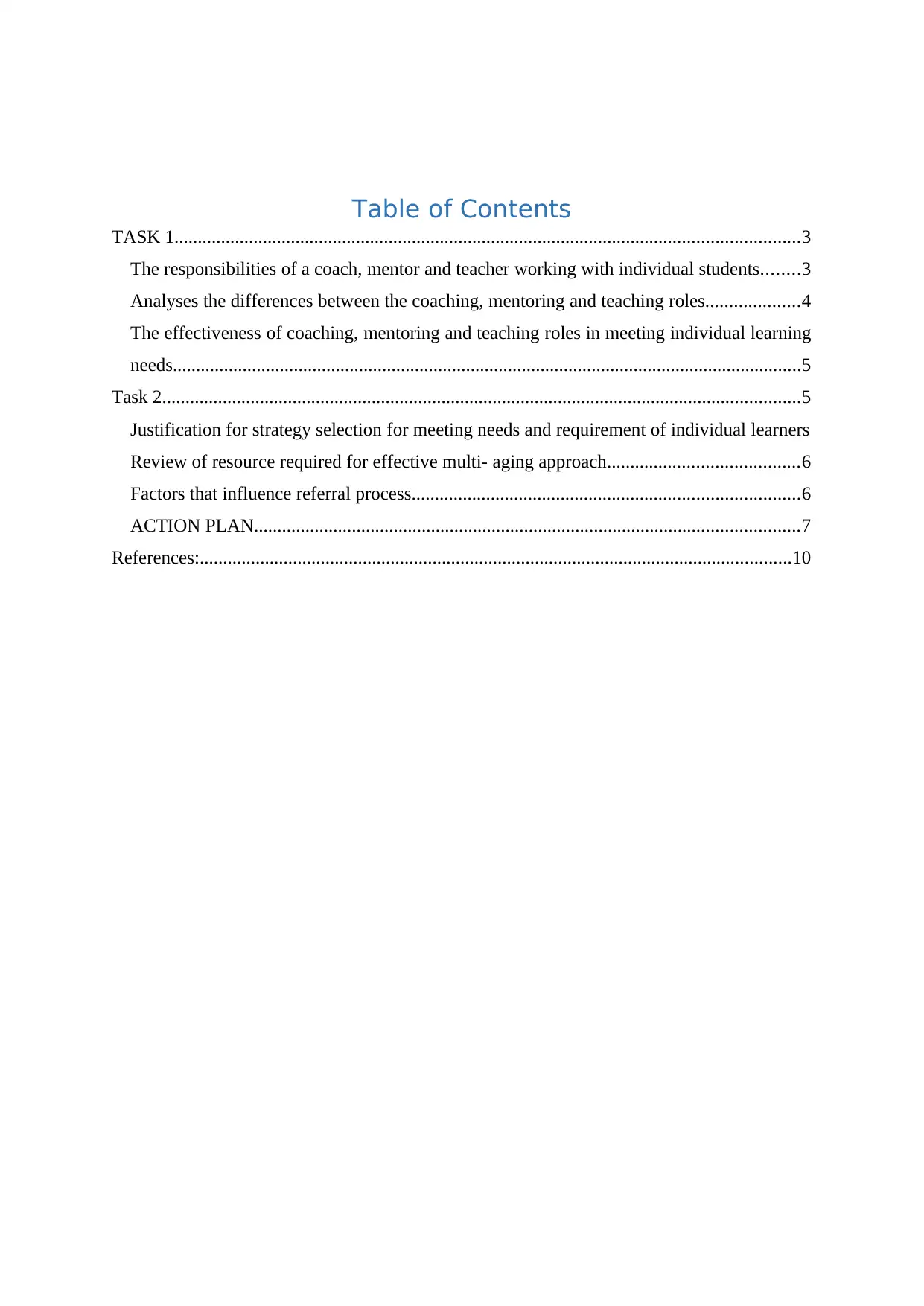
Table of Contents
TASK 1......................................................................................................................................3
The responsibilities of a coach, mentor and teacher working with individual students........3
Analyses the differences between the coaching, mentoring and teaching roles....................4
The effectiveness of coaching, mentoring and teaching roles in meeting individual learning
needs.......................................................................................................................................5
Task 2.........................................................................................................................................5
Justification for strategy selection for meeting needs and requirement of individual learners
Review of resource required for effective multi- aging approach.........................................6
Factors that influence referral process...................................................................................6
ACTION PLAN.....................................................................................................................7
References:...............................................................................................................................10
TASK 1......................................................................................................................................3
The responsibilities of a coach, mentor and teacher working with individual students........3
Analyses the differences between the coaching, mentoring and teaching roles....................4
The effectiveness of coaching, mentoring and teaching roles in meeting individual learning
needs.......................................................................................................................................5
Task 2.........................................................................................................................................5
Justification for strategy selection for meeting needs and requirement of individual learners
Review of resource required for effective multi- aging approach.........................................6
Factors that influence referral process...................................................................................6
ACTION PLAN.....................................................................................................................7
References:...............................................................................................................................10
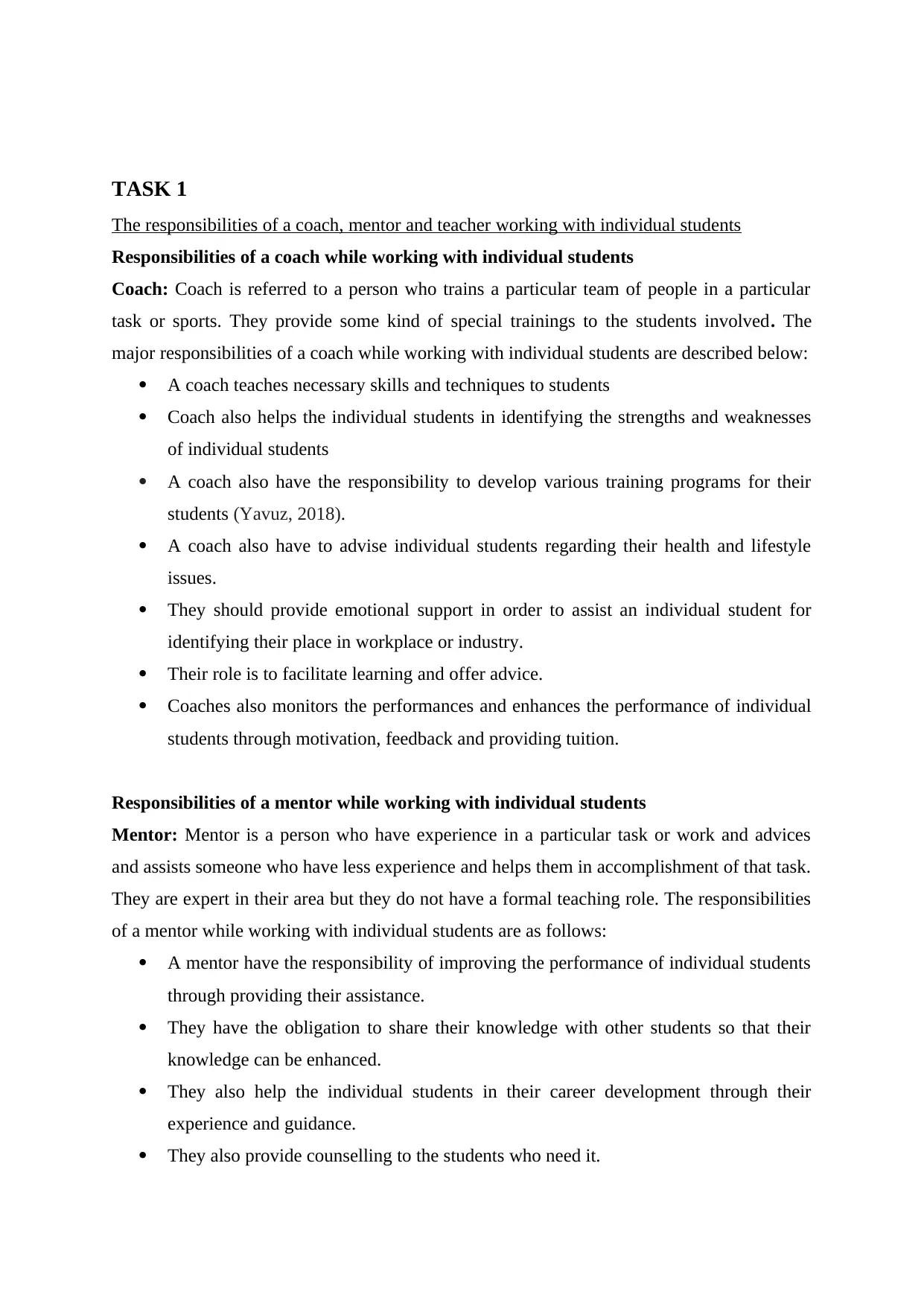
TASK 1
The responsibilities of a coach, mentor and teacher working with individual students
Responsibilities of a coach while working with individual students
Coach: Coach is referred to a person who trains a particular team of people in a particular
task or sports. They provide some kind of special trainings to the students involved. The
major responsibilities of a coach while working with individual students are described below:
A coach teaches necessary skills and techniques to students
Coach also helps the individual students in identifying the strengths and weaknesses
of individual students
A coach also have the responsibility to develop various training programs for their
students (Yavuz, 2018).
A coach also have to advise individual students regarding their health and lifestyle
issues.
They should provide emotional support in order to assist an individual student for
identifying their place in workplace or industry.
Their role is to facilitate learning and offer advice.
Coaches also monitors the performances and enhances the performance of individual
students through motivation, feedback and providing tuition.
Responsibilities of a mentor while working with individual students
Mentor: Mentor is a person who have experience in a particular task or work and advices
and assists someone who have less experience and helps them in accomplishment of that task.
They are expert in their area but they do not have a formal teaching role. The responsibilities
of a mentor while working with individual students are as follows:
A mentor have the responsibility of improving the performance of individual students
through providing their assistance.
They have the obligation to share their knowledge with other students so that their
knowledge can be enhanced.
They also help the individual students in their career development through their
experience and guidance.
They also provide counselling to the students who need it.
The responsibilities of a coach, mentor and teacher working with individual students
Responsibilities of a coach while working with individual students
Coach: Coach is referred to a person who trains a particular team of people in a particular
task or sports. They provide some kind of special trainings to the students involved. The
major responsibilities of a coach while working with individual students are described below:
A coach teaches necessary skills and techniques to students
Coach also helps the individual students in identifying the strengths and weaknesses
of individual students
A coach also have the responsibility to develop various training programs for their
students (Yavuz, 2018).
A coach also have to advise individual students regarding their health and lifestyle
issues.
They should provide emotional support in order to assist an individual student for
identifying their place in workplace or industry.
Their role is to facilitate learning and offer advice.
Coaches also monitors the performances and enhances the performance of individual
students through motivation, feedback and providing tuition.
Responsibilities of a mentor while working with individual students
Mentor: Mentor is a person who have experience in a particular task or work and advices
and assists someone who have less experience and helps them in accomplishment of that task.
They are expert in their area but they do not have a formal teaching role. The responsibilities
of a mentor while working with individual students are as follows:
A mentor have the responsibility of improving the performance of individual students
through providing their assistance.
They have the obligation to share their knowledge with other students so that their
knowledge can be enhanced.
They also help the individual students in their career development through their
experience and guidance.
They also provide counselling to the students who need it.
⊘ This is a preview!⊘
Do you want full access?
Subscribe today to unlock all pages.

Trusted by 1+ million students worldwide
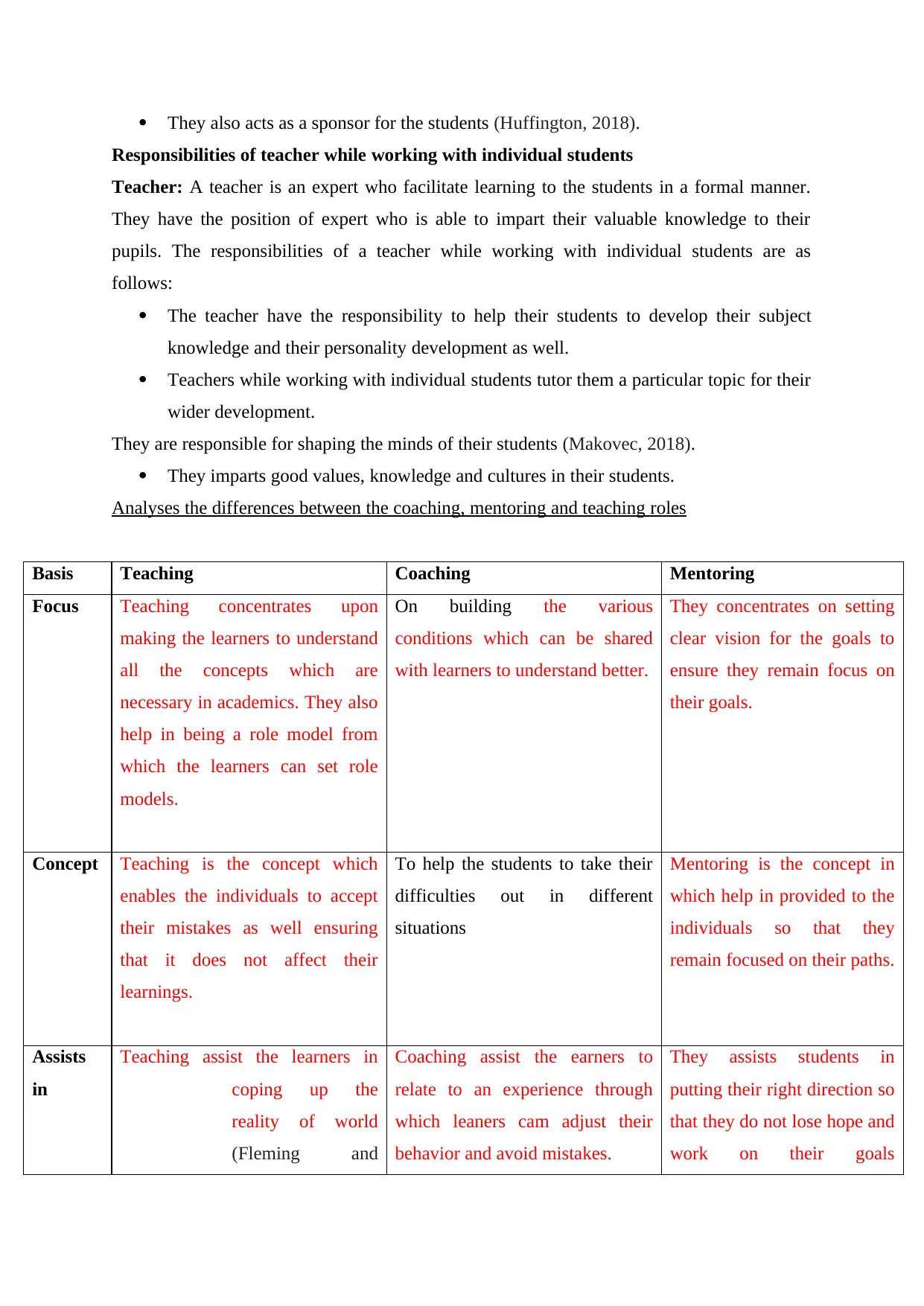
They also acts as a sponsor for the students (Huffington, 2018).
Responsibilities of teacher while working with individual students
Teacher: A teacher is an expert who facilitate learning to the students in a formal manner.
They have the position of expert who is able to impart their valuable knowledge to their
pupils. The responsibilities of a teacher while working with individual students are as
follows:
The teacher have the responsibility to help their students to develop their subject
knowledge and their personality development as well.
Teachers while working with individual students tutor them a particular topic for their
wider development.
They are responsible for shaping the minds of their students (Makovec, 2018).
They imparts good values, knowledge and cultures in their students.
Analyses the differences between the coaching, mentoring and teaching roles
Basis Teaching Coaching Mentoring
Focus Teaching concentrates upon
making the learners to understand
all the concepts which are
necessary in academics. They also
help in being a role model from
which the learners can set role
models.
On building the various
conditions which can be shared
with learners to understand better.
They concentrates on setting
clear vision for the goals to
ensure they remain focus on
their goals.
Concept Teaching is the concept which
enables the individuals to accept
their mistakes as well ensuring
that it does not affect their
learnings.
To help the students to take their
difficulties out in different
situations
Mentoring is the concept in
which help in provided to the
individuals so that they
remain focused on their paths.
Assists
in
Teaching assist the learners in
coping up the
reality of world
(Fleming and
Coaching assist the earners to
relate to an experience through
which leaners cam adjust their
behavior and avoid mistakes.
They assists students in
putting their right direction so
that they do not lose hope and
work on their goals
Responsibilities of teacher while working with individual students
Teacher: A teacher is an expert who facilitate learning to the students in a formal manner.
They have the position of expert who is able to impart their valuable knowledge to their
pupils. The responsibilities of a teacher while working with individual students are as
follows:
The teacher have the responsibility to help their students to develop their subject
knowledge and their personality development as well.
Teachers while working with individual students tutor them a particular topic for their
wider development.
They are responsible for shaping the minds of their students (Makovec, 2018).
They imparts good values, knowledge and cultures in their students.
Analyses the differences between the coaching, mentoring and teaching roles
Basis Teaching Coaching Mentoring
Focus Teaching concentrates upon
making the learners to understand
all the concepts which are
necessary in academics. They also
help in being a role model from
which the learners can set role
models.
On building the various
conditions which can be shared
with learners to understand better.
They concentrates on setting
clear vision for the goals to
ensure they remain focus on
their goals.
Concept Teaching is the concept which
enables the individuals to accept
their mistakes as well ensuring
that it does not affect their
learnings.
To help the students to take their
difficulties out in different
situations
Mentoring is the concept in
which help in provided to the
individuals so that they
remain focused on their paths.
Assists
in
Teaching assist the learners in
coping up the
reality of world
(Fleming and
Coaching assist the earners to
relate to an experience through
which leaners cam adjust their
behavior and avoid mistakes.
They assists students in
putting their right direction so
that they do not lose hope and
work on their goals
Paraphrase This Document
Need a fresh take? Get an instant paraphrase of this document with our AI Paraphraser
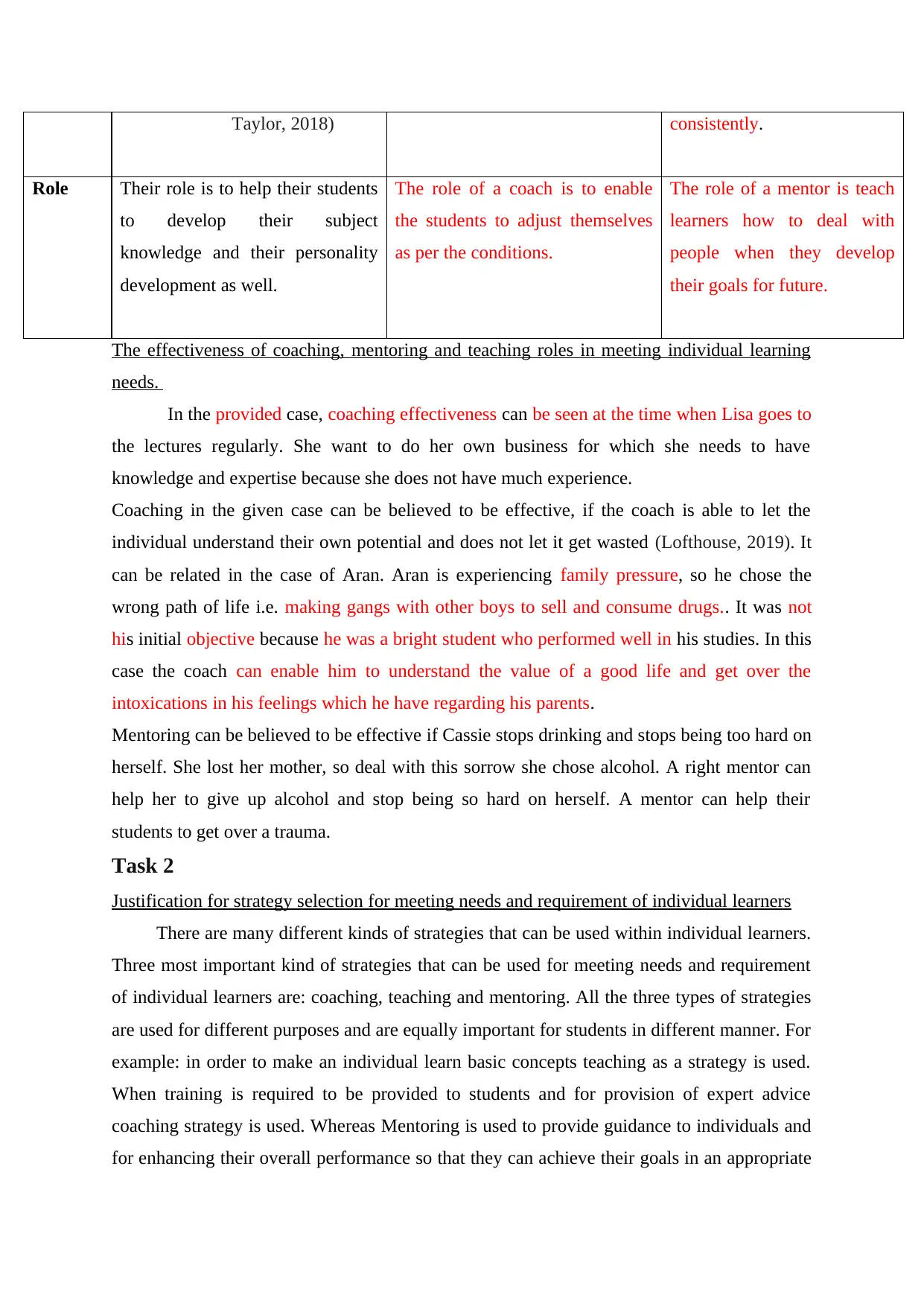
Taylor, 2018) consistently.
Role Their role is to help their students
to develop their subject
knowledge and their personality
development as well.
The role of a coach is to enable
the students to adjust themselves
as per the conditions.
The role of a mentor is teach
learners how to deal with
people when they develop
their goals for future.
The effectiveness of coaching, mentoring and teaching roles in meeting individual learning
needs.
In the provided case, coaching effectiveness can be seen at the time when Lisa goes to
the lectures regularly. She want to do her own business for which she needs to have
knowledge and expertise because she does not have much experience.
Coaching in the given case can be believed to be effective, if the coach is able to let the
individual understand their own potential and does not let it get wasted (Lofthouse, 2019). It
can be related in the case of Aran. Aran is experiencing family pressure, so he chose the
wrong path of life i.e. making gangs with other boys to sell and consume drugs.. It was not
his initial objective because he was a bright student who performed well in his studies. In this
case the coach can enable him to understand the value of a good life and get over the
intoxications in his feelings which he have regarding his parents.
Mentoring can be believed to be effective if Cassie stops drinking and stops being too hard on
herself. She lost her mother, so deal with this sorrow she chose alcohol. A right mentor can
help her to give up alcohol and stop being so hard on herself. A mentor can help their
students to get over a trauma.
Task 2
Justification for strategy selection for meeting needs and requirement of individual learners
There are many different kinds of strategies that can be used within individual learners.
Three most important kind of strategies that can be used for meeting needs and requirement
of individual learners are: coaching, teaching and mentoring. All the three types of strategies
are used for different purposes and are equally important for students in different manner. For
example: in order to make an individual learn basic concepts teaching as a strategy is used.
When training is required to be provided to students and for provision of expert advice
coaching strategy is used. Whereas Mentoring is used to provide guidance to individuals and
for enhancing their overall performance so that they can achieve their goals in an appropriate
Role Their role is to help their students
to develop their subject
knowledge and their personality
development as well.
The role of a coach is to enable
the students to adjust themselves
as per the conditions.
The role of a mentor is teach
learners how to deal with
people when they develop
their goals for future.
The effectiveness of coaching, mentoring and teaching roles in meeting individual learning
needs.
In the provided case, coaching effectiveness can be seen at the time when Lisa goes to
the lectures regularly. She want to do her own business for which she needs to have
knowledge and expertise because she does not have much experience.
Coaching in the given case can be believed to be effective, if the coach is able to let the
individual understand their own potential and does not let it get wasted (Lofthouse, 2019). It
can be related in the case of Aran. Aran is experiencing family pressure, so he chose the
wrong path of life i.e. making gangs with other boys to sell and consume drugs.. It was not
his initial objective because he was a bright student who performed well in his studies. In this
case the coach can enable him to understand the value of a good life and get over the
intoxications in his feelings which he have regarding his parents.
Mentoring can be believed to be effective if Cassie stops drinking and stops being too hard on
herself. She lost her mother, so deal with this sorrow she chose alcohol. A right mentor can
help her to give up alcohol and stop being so hard on herself. A mentor can help their
students to get over a trauma.
Task 2
Justification for strategy selection for meeting needs and requirement of individual learners
There are many different kinds of strategies that can be used within individual learners.
Three most important kind of strategies that can be used for meeting needs and requirement
of individual learners are: coaching, teaching and mentoring. All the three types of strategies
are used for different purposes and are equally important for students in different manner. For
example: in order to make an individual learn basic concepts teaching as a strategy is used.
When training is required to be provided to students and for provision of expert advice
coaching strategy is used. Whereas Mentoring is used to provide guidance to individuals and
for enhancing their overall performance so that they can achieve their goals in an appropriate
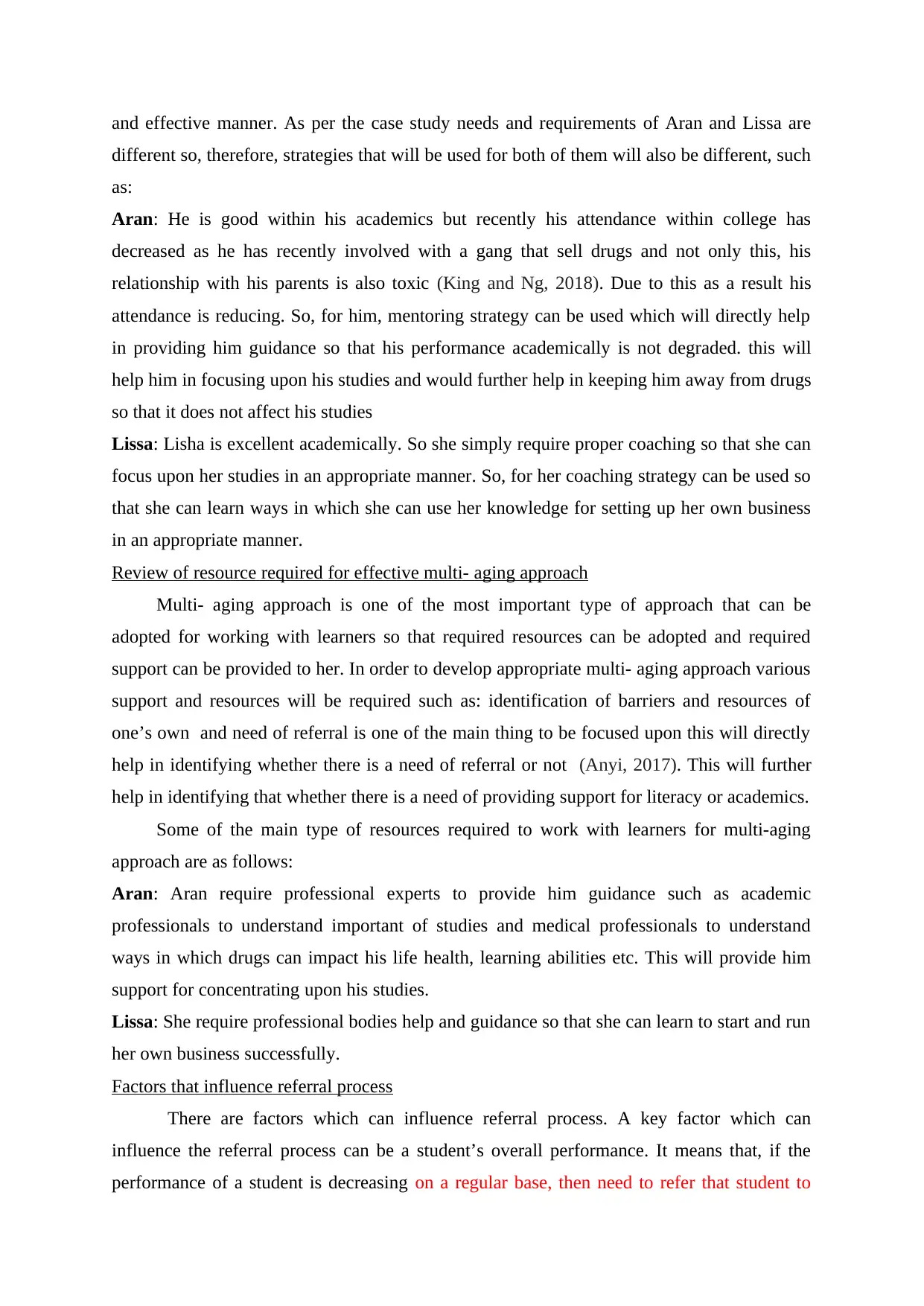
and effective manner. As per the case study needs and requirements of Aran and Lissa are
different so, therefore, strategies that will be used for both of them will also be different, such
as:
Aran: He is good within his academics but recently his attendance within college has
decreased as he has recently involved with a gang that sell drugs and not only this, his
relationship with his parents is also toxic (King and Ng, 2018). Due to this as a result his
attendance is reducing. So, for him, mentoring strategy can be used which will directly help
in providing him guidance so that his performance academically is not degraded. this will
help him in focusing upon his studies and would further help in keeping him away from drugs
so that it does not affect his studies
Lissa: Lisha is excellent academically. So she simply require proper coaching so that she can
focus upon her studies in an appropriate manner. So, for her coaching strategy can be used so
that she can learn ways in which she can use her knowledge for setting up her own business
in an appropriate manner.
Review of resource required for effective multi- aging approach
Multi- aging approach is one of the most important type of approach that can be
adopted for working with learners so that required resources can be adopted and required
support can be provided to her. In order to develop appropriate multi- aging approach various
support and resources will be required such as: identification of barriers and resources of
one’s own and need of referral is one of the main thing to be focused upon this will directly
help in identifying whether there is a need of referral or not (Anyi, 2017). This will further
help in identifying that whether there is a need of providing support for literacy or academics.
Some of the main type of resources required to work with learners for multi-aging
approach are as follows:
Aran: Aran require professional experts to provide him guidance such as academic
professionals to understand important of studies and medical professionals to understand
ways in which drugs can impact his life health, learning abilities etc. This will provide him
support for concentrating upon his studies.
Lissa: She require professional bodies help and guidance so that she can learn to start and run
her own business successfully.
Factors that influence referral process
There are factors which can influence referral process. A key factor which can
influence the referral process can be a student’s overall performance. It means that, if the
performance of a student is decreasing on a regular base, then need to refer that student to
different so, therefore, strategies that will be used for both of them will also be different, such
as:
Aran: He is good within his academics but recently his attendance within college has
decreased as he has recently involved with a gang that sell drugs and not only this, his
relationship with his parents is also toxic (King and Ng, 2018). Due to this as a result his
attendance is reducing. So, for him, mentoring strategy can be used which will directly help
in providing him guidance so that his performance academically is not degraded. this will
help him in focusing upon his studies and would further help in keeping him away from drugs
so that it does not affect his studies
Lissa: Lisha is excellent academically. So she simply require proper coaching so that she can
focus upon her studies in an appropriate manner. So, for her coaching strategy can be used so
that she can learn ways in which she can use her knowledge for setting up her own business
in an appropriate manner.
Review of resource required for effective multi- aging approach
Multi- aging approach is one of the most important type of approach that can be
adopted for working with learners so that required resources can be adopted and required
support can be provided to her. In order to develop appropriate multi- aging approach various
support and resources will be required such as: identification of barriers and resources of
one’s own and need of referral is one of the main thing to be focused upon this will directly
help in identifying whether there is a need of referral or not (Anyi, 2017). This will further
help in identifying that whether there is a need of providing support for literacy or academics.
Some of the main type of resources required to work with learners for multi-aging
approach are as follows:
Aran: Aran require professional experts to provide him guidance such as academic
professionals to understand important of studies and medical professionals to understand
ways in which drugs can impact his life health, learning abilities etc. This will provide him
support for concentrating upon his studies.
Lissa: She require professional bodies help and guidance so that she can learn to start and run
her own business successfully.
Factors that influence referral process
There are factors which can influence referral process. A key factor which can
influence the referral process can be a student’s overall performance. It means that, if the
performance of a student is decreasing on a regular base, then need to refer that student to
⊘ This is a preview!⊘
Do you want full access?
Subscribe today to unlock all pages.

Trusted by 1+ million students worldwide
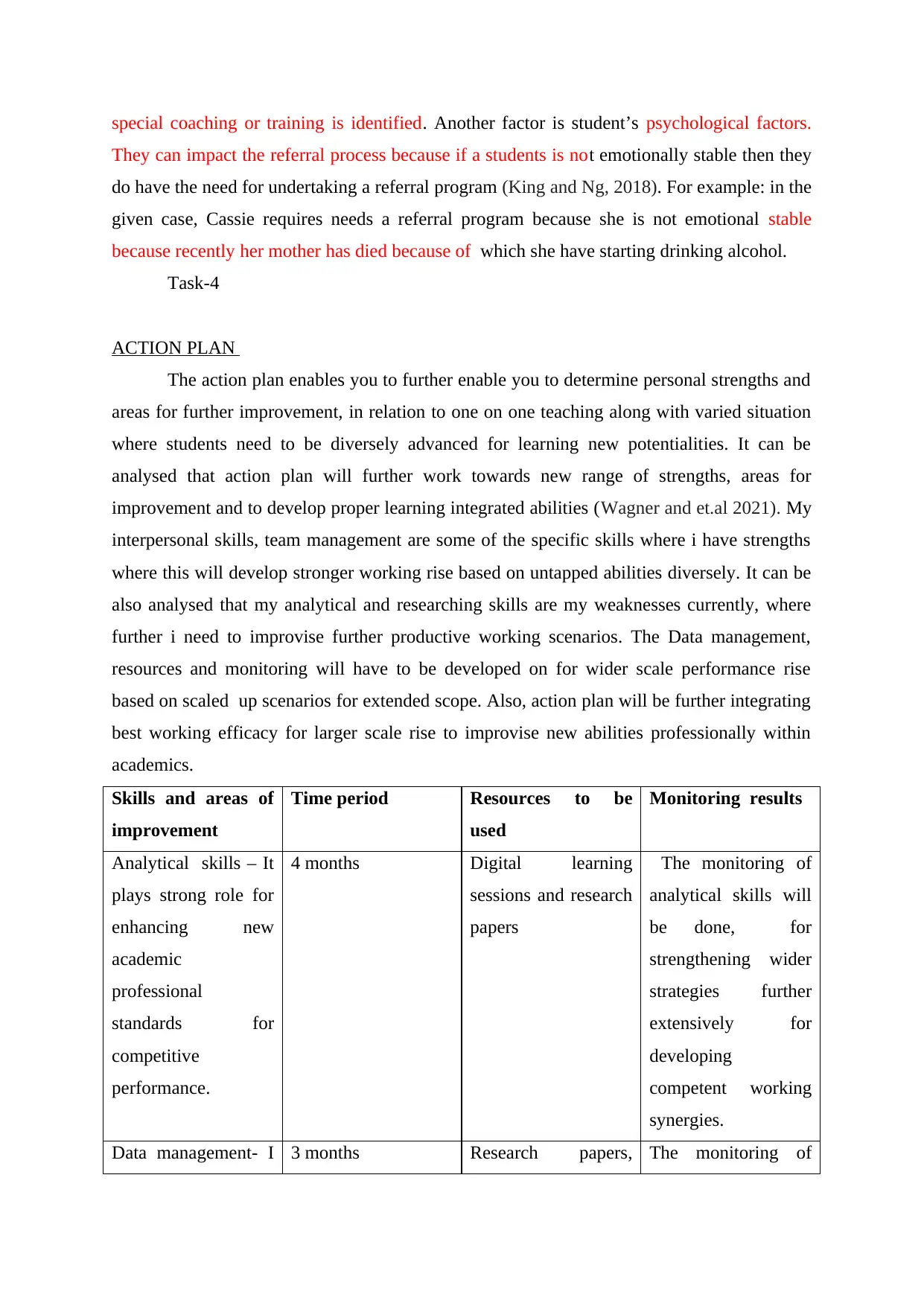
special coaching or training is identified. Another factor is student’s psychological factors.
They can impact the referral process because if a students is not emotionally stable then they
do have the need for undertaking a referral program (King and Ng, 2018). For example: in the
given case, Cassie requires needs a referral program because she is not emotional stable
because recently her mother has died because of which she have starting drinking alcohol.
Task-4
ACTION PLAN
The action plan enables you to further enable you to determine personal strengths and
areas for further improvement, in relation to one on one teaching along with varied situation
where students need to be diversely advanced for learning new potentialities. It can be
analysed that action plan will further work towards new range of strengths, areas for
improvement and to develop proper learning integrated abilities (Wagner and et.al 2021). My
interpersonal skills, team management are some of the specific skills where i have strengths
where this will develop stronger working rise based on untapped abilities diversely. It can be
also analysed that my analytical and researching skills are my weaknesses currently, where
further i need to improvise further productive working scenarios. The Data management,
resources and monitoring will have to be developed on for wider scale performance rise
based on scaled up scenarios for extended scope. Also, action plan will be further integrating
best working efficacy for larger scale rise to improvise new abilities professionally within
academics.
Skills and areas of
improvement
Time period Resources to be
used
Monitoring results
Analytical skills – It
plays strong role for
enhancing new
academic
professional
standards for
competitive
performance.
4 months Digital learning
sessions and research
papers
The monitoring of
analytical skills will
be done, for
strengthening wider
strategies further
extensively for
developing
competent working
synergies.
Data management- I 3 months Research papers, The monitoring of
They can impact the referral process because if a students is not emotionally stable then they
do have the need for undertaking a referral program (King and Ng, 2018). For example: in the
given case, Cassie requires needs a referral program because she is not emotional stable
because recently her mother has died because of which she have starting drinking alcohol.
Task-4
ACTION PLAN
The action plan enables you to further enable you to determine personal strengths and
areas for further improvement, in relation to one on one teaching along with varied situation
where students need to be diversely advanced for learning new potentialities. It can be
analysed that action plan will further work towards new range of strengths, areas for
improvement and to develop proper learning integrated abilities (Wagner and et.al 2021). My
interpersonal skills, team management are some of the specific skills where i have strengths
where this will develop stronger working rise based on untapped abilities diversely. It can be
also analysed that my analytical and researching skills are my weaknesses currently, where
further i need to improvise further productive working scenarios. The Data management,
resources and monitoring will have to be developed on for wider scale performance rise
based on scaled up scenarios for extended scope. Also, action plan will be further integrating
best working efficacy for larger scale rise to improvise new abilities professionally within
academics.
Skills and areas of
improvement
Time period Resources to be
used
Monitoring results
Analytical skills – It
plays strong role for
enhancing new
academic
professional
standards for
competitive
performance.
4 months Digital learning
sessions and research
papers
The monitoring of
analytical skills will
be done, for
strengthening wider
strategies further
extensively for
developing
competent working
synergies.
Data management- I 3 months Research papers, The monitoring of
Paraphrase This Document
Need a fresh take? Get an instant paraphrase of this document with our AI Paraphraser
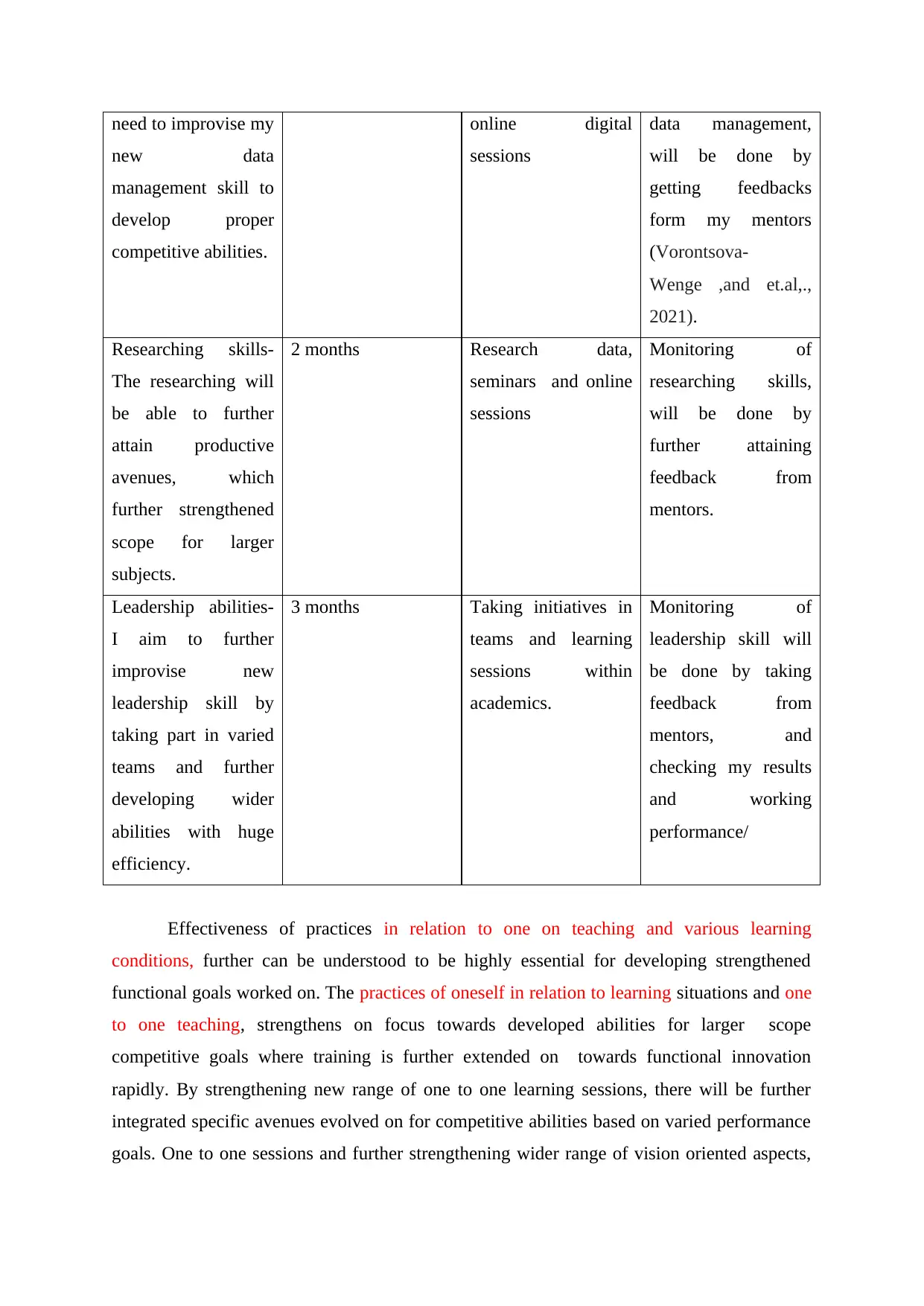
need to improvise my
new data
management skill to
develop proper
competitive abilities.
online digital
sessions
data management,
will be done by
getting feedbacks
form my mentors
(Vorontsova-
Wenge ,and et.al,.,
2021).
Researching skills-
The researching will
be able to further
attain productive
avenues, which
further strengthened
scope for larger
subjects.
2 months Research data,
seminars and online
sessions
Monitoring of
researching skills,
will be done by
further attaining
feedback from
mentors.
Leadership abilities-
I aim to further
improvise new
leadership skill by
taking part in varied
teams and further
developing wider
abilities with huge
efficiency.
3 months Taking initiatives in
teams and learning
sessions within
academics.
Monitoring of
leadership skill will
be done by taking
feedback from
mentors, and
checking my results
and working
performance/
Effectiveness of practices in relation to one on teaching and various learning
conditions, further can be understood to be highly essential for developing strengthened
functional goals worked on. The practices of oneself in relation to learning situations and one
to one teaching, strengthens on focus towards developed abilities for larger scope
competitive goals where training is further extended on towards functional innovation
rapidly. By strengthening new range of one to one learning sessions, there will be further
integrated specific avenues evolved on for competitive abilities based on varied performance
goals. One to one sessions and further strengthening wider range of vision oriented aspects,
new data
management skill to
develop proper
competitive abilities.
online digital
sessions
data management,
will be done by
getting feedbacks
form my mentors
(Vorontsova-
Wenge ,and et.al,.,
2021).
Researching skills-
The researching will
be able to further
attain productive
avenues, which
further strengthened
scope for larger
subjects.
2 months Research data,
seminars and online
sessions
Monitoring of
researching skills,
will be done by
further attaining
feedback from
mentors.
Leadership abilities-
I aim to further
improvise new
leadership skill by
taking part in varied
teams and further
developing wider
abilities with huge
efficiency.
3 months Taking initiatives in
teams and learning
sessions within
academics.
Monitoring of
leadership skill will
be done by taking
feedback from
mentors, and
checking my results
and working
performance/
Effectiveness of practices in relation to one on teaching and various learning
conditions, further can be understood to be highly essential for developing strengthened
functional goals worked on. The practices of oneself in relation to learning situations and one
to one teaching, strengthens on focus towards developed abilities for larger scope
competitive goals where training is further extended on towards functional innovation
rapidly. By strengthening new range of one to one learning sessions, there will be further
integrated specific avenues evolved on for competitive abilities based on varied performance
goals. One to one sessions and further strengthening wider range of vision oriented aspects,
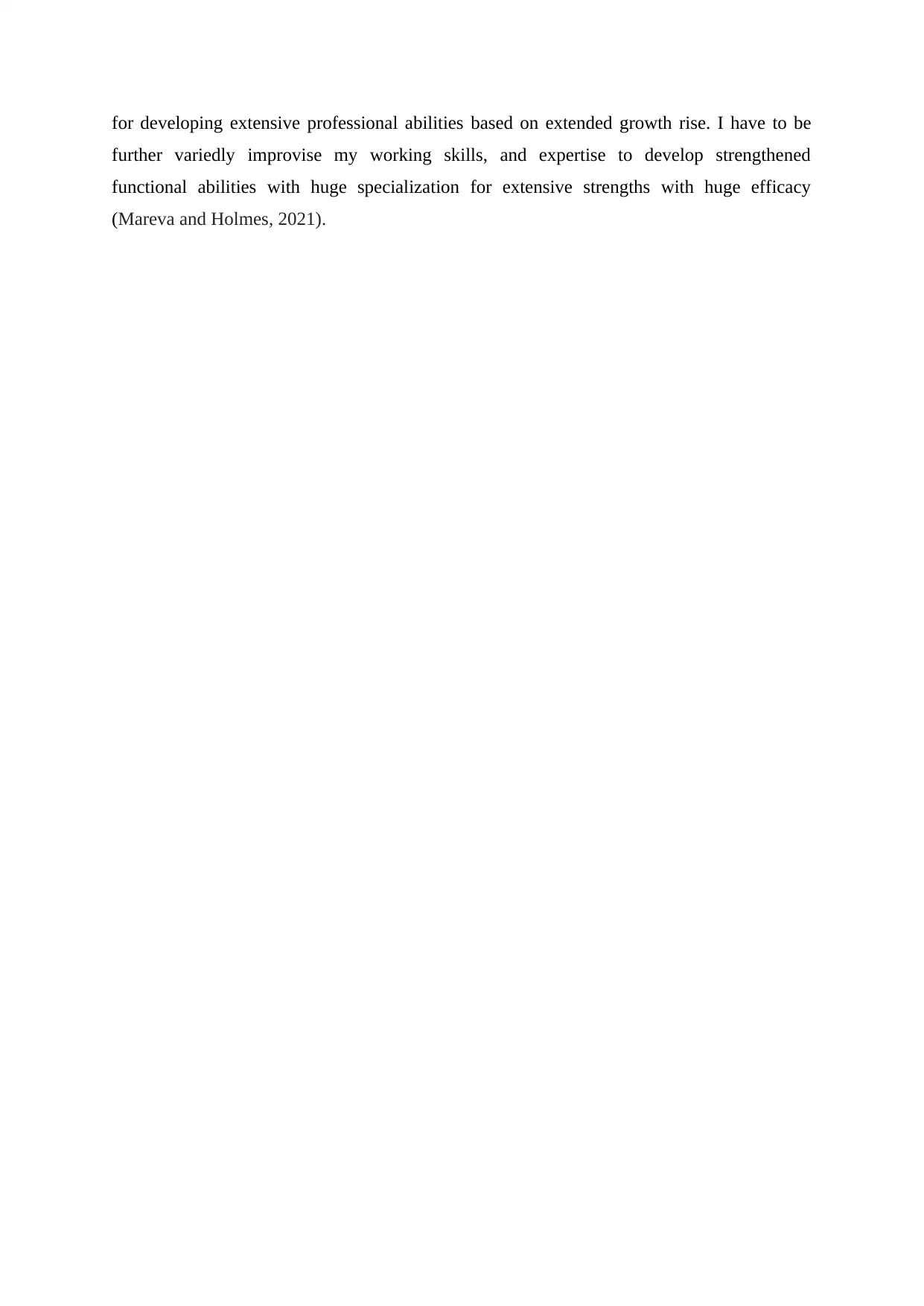
for developing extensive professional abilities based on extended growth rise. I have to be
further variedly improvise my working skills, and expertise to develop strengthened
functional abilities with huge specialization for extensive strengths with huge efficacy
(Mareva and Holmes, 2021).
further variedly improvise my working skills, and expertise to develop strengthened
functional abilities with huge specialization for extensive strengths with huge efficacy
(Mareva and Holmes, 2021).
⊘ This is a preview!⊘
Do you want full access?
Subscribe today to unlock all pages.

Trusted by 1+ million students worldwide
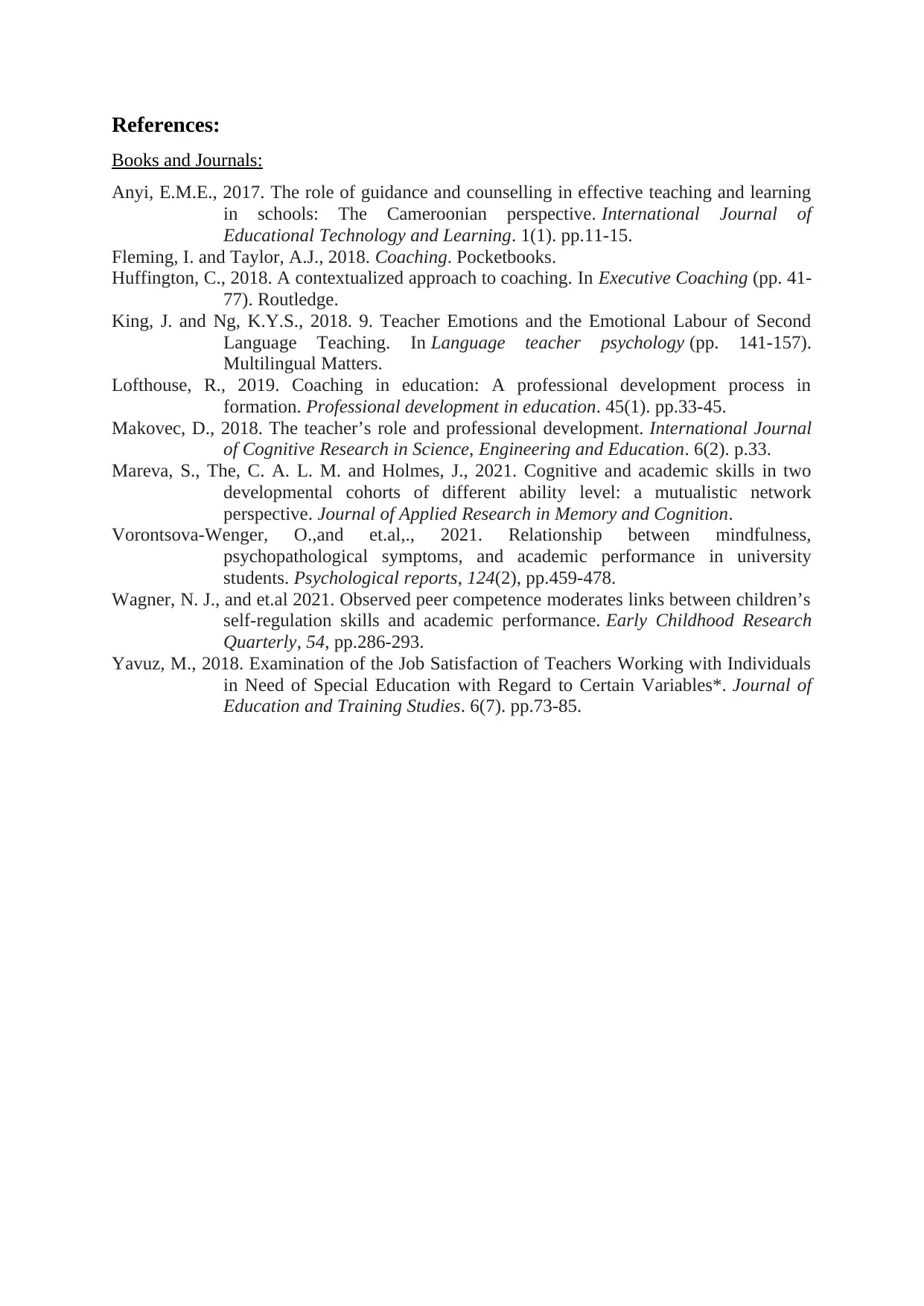
References:
Books and Journals:
Anyi, E.M.E., 2017. The role of guidance and counselling in effective teaching and learning
in schools: The Cameroonian perspective. International Journal of
Educational Technology and Learning. 1(1). pp.11-15.
Fleming, I. and Taylor, A.J., 2018. Coaching. Pocketbooks.
Huffington, C., 2018. A contextualized approach to coaching. In Executive Coaching (pp. 41-
77). Routledge.
King, J. and Ng, K.Y.S., 2018. 9. Teacher Emotions and the Emotional Labour of Second
Language Teaching. In Language teacher psychology (pp. 141-157).
Multilingual Matters.
Lofthouse, R., 2019. Coaching in education: A professional development process in
formation. Professional development in education. 45(1). pp.33-45.
Makovec, D., 2018. The teacher’s role and professional development. International Journal
of Cognitive Research in Science, Engineering and Education. 6(2). p.33.
Mareva, S., The, C. A. L. M. and Holmes, J., 2021. Cognitive and academic skills in two
developmental cohorts of different ability level: a mutualistic network
perspective. Journal of Applied Research in Memory and Cognition.
Vorontsova-Wenger, O.,and et.al,., 2021. Relationship between mindfulness,
psychopathological symptoms, and academic performance in university
students. Psychological reports, 124(2), pp.459-478.
Wagner, N. J., and et.al 2021. Observed peer competence moderates links between children’s
self-regulation skills and academic performance. Early Childhood Research
Quarterly, 54, pp.286-293.
Yavuz, M., 2018. Examination of the Job Satisfaction of Teachers Working with Individuals
in Need of Special Education with Regard to Certain Variables*. Journal of
Education and Training Studies. 6(7). pp.73-85.
Books and Journals:
Anyi, E.M.E., 2017. The role of guidance and counselling in effective teaching and learning
in schools: The Cameroonian perspective. International Journal of
Educational Technology and Learning. 1(1). pp.11-15.
Fleming, I. and Taylor, A.J., 2018. Coaching. Pocketbooks.
Huffington, C., 2018. A contextualized approach to coaching. In Executive Coaching (pp. 41-
77). Routledge.
King, J. and Ng, K.Y.S., 2018. 9. Teacher Emotions and the Emotional Labour of Second
Language Teaching. In Language teacher psychology (pp. 141-157).
Multilingual Matters.
Lofthouse, R., 2019. Coaching in education: A professional development process in
formation. Professional development in education. 45(1). pp.33-45.
Makovec, D., 2018. The teacher’s role and professional development. International Journal
of Cognitive Research in Science, Engineering and Education. 6(2). p.33.
Mareva, S., The, C. A. L. M. and Holmes, J., 2021. Cognitive and academic skills in two
developmental cohorts of different ability level: a mutualistic network
perspective. Journal of Applied Research in Memory and Cognition.
Vorontsova-Wenger, O.,and et.al,., 2021. Relationship between mindfulness,
psychopathological symptoms, and academic performance in university
students. Psychological reports, 124(2), pp.459-478.
Wagner, N. J., and et.al 2021. Observed peer competence moderates links between children’s
self-regulation skills and academic performance. Early Childhood Research
Quarterly, 54, pp.286-293.
Yavuz, M., 2018. Examination of the Job Satisfaction of Teachers Working with Individuals
in Need of Special Education with Regard to Certain Variables*. Journal of
Education and Training Studies. 6(7). pp.73-85.
1 out of 10
Related Documents
Your All-in-One AI-Powered Toolkit for Academic Success.
+13062052269
info@desklib.com
Available 24*7 on WhatsApp / Email
![[object Object]](/_next/static/media/star-bottom.7253800d.svg)
Unlock your academic potential
Copyright © 2020–2026 A2Z Services. All Rights Reserved. Developed and managed by ZUCOL.




